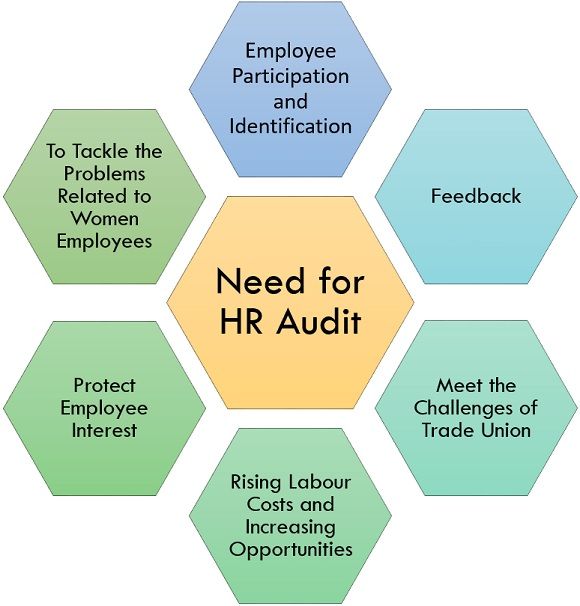Definition: HR Audit or Human Resource Audit is a process of examining the efficiency of the human resource divisions of the company to help them in assessing their current position. It is very much similar to the financial audit procedure. To understand its HR policies, the company does the human resource audit so that a clear picture of its practices comes out, which helps the company analyze what has been achieved and what needs to be achieved by the company.
Inherently, a human resource audit contains an organized analysis of all the accounting policies and practices of the business, which becomes a tool for the company to manage its competitive edges by improving effectiveness and efficiency. The aim of conducting this audit is to acknowledge the strength and weaknesses of the human resource functions of the company.
Content: HR Audit
Elements of HR Audit
Human resource audit becomes efficient when the following points are taken care of:
- HR audit should be done thoroughly and should comprise all human-related functions.
- The company needs to hire an expert for the human resource audit.
- The outcomes of the audit should be shared with all the staff of the company.
- The company needs to determine and follow the uniformity of the human resource audit depending upon its business plans and growth cycle.
Process of HR Audit
The following procedure will be followed for the audit of human resources:
- Step 1- The first step should be an examination of the company’s nature, whether it is a professional’s enterprise or a general business enterprise; then,
- Step 2- Conduct a conference with the top managerial cadre to collect information and facts related to human resource assessment. An adequate provision should be made for the depreciation of human assets.
- Step 3- The company’s balance sheet should be thoroughly checked whether the correct values are placed or not.
- Step 4- Thereafter, an Internal control system of the company should be inspected with respect to the facts of the human resources for examining its efficiency.
- Step 5 –At the time of value assessment of human resources, all the contingencies should be considered, which may impact the valuation.
Need for HR Audit
To make the show interesting and increase the effectiveness of the company, management found the solution incompetent workforce. HR development functions should be performed as per the planning and expected results. To ensure and not to take the chance, the company undertake human resource department audit due to the following reasons:

1. Employee Participation and Identification
A change has taken place in managerial philosophy. The management now feels the employee’s participation in the activities of the company and their identification with its essential for the successful making of the company.
2. Feedback
As a company grows, constant feedback is required to enhance the conduct of its personnel. It becomes much easier with the help of a human resource audit as it provides required feedback. Especially, diversified and decentralized companies need feedback more essentially.
3. Meet the Challenges of Trade Union
Trade unions have become more powerful and are playing a more active role in human resource management. They often question management’s competent in industrial relations. Management can meet this challenge through the HR audit.
4. Rising Labour Costs and Increasing Opportunities
Human resource audit is becoming necessary due to rising labour cost and increasing opportunities for competitive advantage in human resource management.
5. Protect Employee Interest
HR audit helps in refraining from the interventions caused by the government for protecting the employees’ interest.
6. To Tackle the Problems Related to Women Employees
The growing proportion of technical, professional and women employees create more complicated problems in human resource management. An HR audit is required to tackle these problems.
Obstacles of Human Resource Audit
The auditor needs to intimately connect with the assessment of the human resource, although he is not a master of human resource valuation. For which he has to calculate the values entered in the balance sheet as a net value of human assets. However, there are various hurdles that the auditor has to face while assessing the value of human resources. These obstacles are explained below:
- Discovering the exact value of an individual is not desirable. Thus, the procedure of audit under human resource audit is obliged to give impractical approach.
- It’s challenging for the auditor to judge the personnel’s value which has qualified the process proposed by the valuers.
- There is a possibility of biased appraisal in an examination of resources. Thus, the procedure of audit cannot assure the authenticity of the information.
- The auditor faces various hurdles in gathering the requisite data on which the HR valuation has been established.
- As HR audit is not a very famous concept and is followed by very few companies, the auditor may find difficulties for the purpose of audit.
Benefits of Human Resource Audit
The HR Audit provides the following benefits to the company:
- Human resource audit helps in arranging the provable information about the human resource functions of the company.
- It simplifies the duties and responsibilities of the personnel of the HR department.
- HR audit provides aid in recognizing crucial HR dilemmas.
- It helps in aligning human resource strategies with managerial strategies.
- Human resource audit enhances the prominence of the HR functions of the company.
- It helps in shortening the HR cost of the company.
Conclusion
HR Audit is involved with the human assets of the company that emerges in the balance sheet by way of checking, investigating and assessing the diversified data and values based on the approximated figures of the human resources.
Leave a Reply